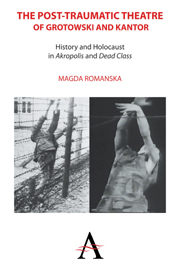 The Post-traumatic Theatre of Grotowski and Kantor
The Post-traumatic Theatre of Grotowski and Kantor Just because we are postscript, it doesn't mean that the script is not there. On the contrary, to paraphrase Derrida, there is nothing but the script.
I have decided to call Kantor and Grotowski's theatre post-traumatic rather than postdramatic, recognizing that these two concepts, one derived from psychology and the other from theatre theory, are fundamentally connected. In her introduction to Hans-Ties Lehman's milestone book on Postdramatic Theatre, the translator, Karen Jürs- Munby, explains that the ‘post’ in ‘postdramatic’ is to be understood
as a rupture and a beyond that continue to entertain relationships with drama and are in many ways an analysis and ‘anamnesis’ of drama. To call theatre ‘postdramatic’ involves subjecting the traditional relationship of theatre to drama to deconstruction and takes account of the numerous ways in which this relationship has been refigured in contemporary practices since the 1970s.
As Jürs-Munby notes, ‘postdramatic’ denotes a rupture between drama and theatre visà- vis their symbiotic past. Likewise, trauma is defined as a violent rupture in the social and psychological order that fundamentally alters an individual's concept of the self and the world. Trauma denotes a rupture between the individual and the world: just as postdrama is no longer bound to theatre (“there can be theatre without drama”), the traumatized individual is no longer bound to the world that betrayed him.
To save this book to your Kindle, first ensure no-reply@cambridge.org is added to your Approved Personal Document E-mail List under your Personal Document Settings on the Manage Your Content and Devices page of your Amazon account. Then enter the ‘name’ part of your Kindle email address below. Find out more about saving to your Kindle.
Note you can select to save to either the @free.kindle.com or @kindle.com variations. ‘@free.kindle.com’ emails are free but can only be saved to your device when it is connected to wi-fi. ‘@kindle.com’ emails can be delivered even when you are not connected to wi-fi, but note that service fees apply.
Find out more about the Kindle Personal Document Service.
To save content items to your account, please confirm that you agree to abide by our usage policies. If this is the first time you use this feature, you will be asked to authorise Cambridge Core to connect with your account. Find out more about saving content to Dropbox.
To save content items to your account, please confirm that you agree to abide by our usage policies. If this is the first time you use this feature, you will be asked to authorise Cambridge Core to connect with your account. Find out more about saving content to Google Drive.